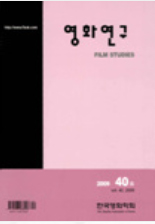- 영문명
- National Discourse in Korean Costume Films with Setting in Capital Kyoungsung
- 발행기관
- 한국영화학회
- 저자명
- 김시무
- 간행물 정보
- 『영화연구』제40호, 37~70쪽, 전체 34쪽
- 주제분류
- 예술체육 > 예술일반
- 파일형태
- 발행일자
- 2009.06.30

국문 초록
영문 초록
My aim in this thesis is to study National Discourses in so-called Korean Costume Films with setting in Capital Kyoungsung from 1930s to 1940s. As we all know, Kyoungsung is the capital of Chosun for the period of Japanese imperialism occupation. What is a costume film? According to F. E. Beaver, a costume film is a motion-picture genre characterized by historical pageantry and spectacle. Since the beginning of the film narrative, the costume spectacle has been a commercial mainstay of the screen. In this context, I would like to call these films with setting in Capital Kyoungsung a costume film. My main point is that while a costume film is based upon fictional events, a historical film is based upon historical facts. As in the past, a historical film with setting in Japanese imperialism seeks to express a national consciousness. However, present costume films have a tendency to fling off an oppressive feeling on historical facts. With this premise, I deal several Korean films with setting in Japanese imperialism. These films are Radio Dayz(2008), Modern Boy(2008), Once Upon a Time (2008), and Shadow Murder(2009). First of all, these films seek to escape from the matrix of The National History. Also these films seek to represent Kyoungsung as a space of play and freedom. Nevertheless, there is a common feature in these films. That is, these films deal with a question of national discourse unconsciously. The reason that I'm taking notice of such a question is that there is still a ghost of nationalism haunting in these films with setting in Japanese imperialism. According to professor Kim. Kibong, this results from that a historical consciousness of Korean people is still stick to the matrix of The National History. Externally, these films aimed to express the mood and spirit of modern times and to expose the personal desire of modern boy & modern girl. However, internally, these films were caught in a trap of nationalism, that is, of grand discourse of the national. Therefore, in this thesis my main task is critically to inquiry an obsession of anti-Japanese sentiments, and then, to seek the method to escape from the matrix of The National History. Beyond this matrix, we have to seek diversities of discourse. These films are on the way from the matrix of The National History to the desert of the Real.
목차
1. 들어가는 말
2. 탈국사화 영화의 맹아적 단계
3. 국사의 매트릭스에서 실재계의 사막으로
4. 글을 나가며
해당간행물 수록 논문
참고문헌
최근 이용한 논문
교보eBook 첫 방문을 환영 합니다!

신규가입 혜택 지급이 완료 되었습니다.
바로 사용 가능한 교보e캐시 1,000원 (유효기간 7일)
지금 바로 교보eBook의 다양한 콘텐츠를 이용해 보세요!


